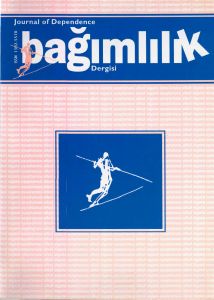Tip I ve tip II alkolik çocuklarında akademik başarı
Anahtar Kelimeler:
Tip- Alkolizm- Çocuklar- Akademik BaşarıÖz
Amaç: Bu çalışmada belli bir alkolizm tipine sahip babaların çocukları ile çalışılarak ebeveyn alkolizm tipinden çocukların akademik düzeyde etkilenmeleri değerlendirilmek istenmiştir.
Yöntem: Ege Üniversitesi Tıp Fakültesi Alkol Madde Bağımlılık Birimi’nde detoksifikasyon tedavileri tamamlanmış, en az bir aydır alkol içmeyen alkolik babalara Sosyodemog-rafik Veri Formu I, SCID-I ve Michigan Alkolizm Tarama Testi uygulanmıştır. Elde edilen veriler ve Cloninger’in alkolizm tipolojisi göz önüne alınarak Alkol Madde Bağımlılık Biri-mi’nde yapılan değerlendirmelerle babaların alkolizm tipleri belirlenmiştir. Bu babaların 8-12 yaş arasındaki çocukları ile DSM-IV tanı ölçütlerine göre psikiyatrik görüşme yapılmıştır. Çocuklara Sosyodemografik Veri Formu II uygulanmış, çocuklar tarafından Çocuklar İçin Depresyon Ölçeği (CDI), anne ve babalar tarafından Çocuk ve Gençler İçin Davranış Değerlendirme Ölçeği (CBCL) ve öğretmen tarafından Öğretmen Bilgi Formu (TRF) doldurulmuştur.
Bulgular: Tip I alkol bağımlılığı grubunda 25 alkolik baba ve çocukları, Tip II alkol bağımlılığı grubunda 10 alkolik baba ve çocukları çalışmaya katılmıştır. CBCL sonuçlarına göre, Tip II alkoliklerin çocuklarında saldırgan davranışlar düşük bulunmuştur. TRF sonuçlarındaki sıkı çalışma, saldırgan davranışlar ve toplam problem Tip II alkoliklerin çocuklarında anlamlı olarak düşük bulunmuştur. Sıkı çalışma, öğrenme ile kuvvetli pozitif bir ilişki göstermiştir. Benzer şekilde okul başarısı, uygun davranma ile de sıkı çalışma arasında pozitif yönde bir ilişki bulunmuştur.
Sonuç: Tip I alkol grubundaki çocuklar saldırgan davranışlar ve toplam problem alanlarında sorun yaşamaktadırlar. Tip II alkol grubundaki çocuklar ders çalışma, öğrenme ve okul başarısında Tip I alkol grubuna göre daha fazla sorun yaşamaktadırlar.
Referanslar
Fine E. Observations of young children from alcoholic homes Philadelphia: West Philadelphia Community Mental Health Consortium 1975.
Rimmer J. The children of alcoholic. An exploratory study. Child Youth Serv Rev1982; 4: 365-373.
Hughes JM. Adolescent children of alcoholic parent s and the relationship of Alateen to these children. J Consult Clin Psychol 1977; 45: 946-947.
Miller D, Jung M. Children of alcoholic. A 20 years longitudinal study. Soc Work Res 1977; 13: 23-29.
Knop J, Teasdale TV, Schulsinger F, Goodwin DW. A prospective study of young men at high risk for alcoholism. School behavior and achievement J Stud. Alcohol 1985; 46: 273-278.
Cacas-Gil MJ, Navarro-Guzman JI. Scool caharacteristics among children of alcoholic parents. Psychol Rep 2002; 90:341-348.
Cloninger CR. Neurogenetic adaptive mechanisms in alcoholism. Science 1987; 236: 410-416.
Özkaragöz T, Satz P, Noble EP. Neuropsychological functioning in sons of active alcoholic, recovering alcoholic, and sosial drinking fathers. Alcohol 1997; 14: 31-37.
Hill SY, Locke J, Lowers L, Connolly J. Psyhopathology and achievement in children at high risk for developing alcoholism, J Am Acad Child Adolesc Psychiatry 1999; 38: 883891.
Spitzer RL, Williams JBW, Gibbon M, et al. Stuctured Clinical Interview for DSM-III-R. Washington, DC: American Psychiatric Press, 1987.
Sorias S, Saygılı R, Elbi H. DSM-III-R Yapılandırılmış Klinik Görüşmesi Türkçe Versiyonu SCID Kullanma Kılavuzu. İzmir: Ege Üniversitesi Yayınları, 1988.
Coşkunol H, Bağdiken İ, Sorias S, Saygılı R. Michigan Alkolizm Tarama Testi (MATT) Geçerliliği, Ege Tıp Dergisi 1995; 34: 1518.
Kovacs M. Rating Scales to assess depression in school aged children. Acta Paedopsychiat 1981; 46: 305-313.
Kovacs M. The Children’s Depression Inventory (CDI) Psychopharmacol Bull 1985; 21: 995-998.
Öy B. Çocuklar için Depresyon Ölçeği: geçerlilik ve güvenirlik çalışması. Türk Psikiyatri Dergisi 1991; 2:132-136.
Achenbach TM, Howel CT, Quay HC, Canners CK. National survey of problems and competencies among four-to-sixteen-year-olds. Monogr Soc Res Child Dev 1991; 6:11.
Akçalın M, Savaşır I. Çocukların davranışlarını değerlendirme ölçeğinin tanıtımı ve güvenirlik çalışması. Psikoloji Dergisi 1985; 5: 3-6.
Erol N, Aslan L, Akçalın M. The adaptation and standardisation of the child behavior checklist among 6-18 year-old Turkish children. Sergeant J, Fotorotor Egg (Eds).Eunethydis Europan Approaches to Hyperkinetic Disorders, Zurich1995, s. 109113.
Achenbach TM, Howel CT, Quay HC, Canners CK. National survey of problems and competencies among four-to-sixteen-year-olds. Monogr Soc Res Child Dev 1991; 6:11.
Achenbach TM. Manuel for the child behavior checklist 418. Profil: University of Vermont, Department of Psychiatry, Burlington VT, 1991.
Erol N, Kılıç C, Ulusoy M ve ark. Türkiye Ruh Sağlığı Profili: Çocuk ve Gençlerde Ruh Sağlığı: Yeterlilik Alanları Davranış ve Duygusal Sorunların Dağılımı. Ankara: Eksen tanıtım Limitet Şirketi, 1998; 25-75.
Rubio-Stipec M, Bird H. Children of alcoholic parents in the community. J Stud Alcohol 1991; 52: 78-88.
Tarter RE, Jacob T, Bremer DL. Spesific cognitive impairment in sons of early onset alcoholics. Alcohol Clin Exp Res 1989; 13: 786-789.
İndir
Yayınlanmış
Sayı
Bölüm
Lisans
Telif Hakkı (c) 2025 Bağımlılık Dergisi

Bu çalışma Creative Commons Attribution-NonCommercial-NoDerivatives 4.0 International License ile lisanslanmıştır.
Dergimiz ve bu internet sitesinin tüm içeriği Creative Commons Atıf-GayriTicari-Türetilemez 4.0 Uluslararası (CC BY-NC-ND 4.0) lisansının şartları ile ruhsatlandırılmıştır. Bu durum, Budapeşte açık erişim girişiminin (BOAI) açık erişim tanımı ile uyumludur. Creative Commons Atıf-GayriTicari-Türetilemez Lisansı, kullanıcıların bir makaleyi kopyalamasına, değiştirmeden dağıtmasına ve nakletmesine ve makalenin ticari olmayan mahiyette kullanılmasına imkan tanımaktadır. CC BY-NC-ND 4.0 lisansı, yazarına uygun şekilde atfedildiği sürece açık erişimli bir makalenin ticari olmayan mahiyette kullanılmasına izin vermektedir.

